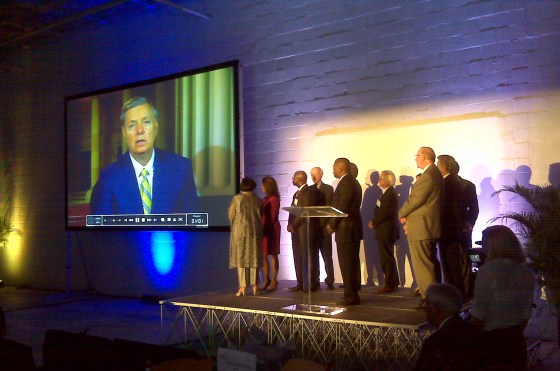The other night, I went to a reception for new Commerce Secretary Bobby Hitt, my old shipmate at The State. Bobby was near the front door, and we exchanged pleasantries. Standing there with him and Mike Briggs from Central SC Alliance was the head guy from Amazon, whose name escapes me at the moment — and he didn’t have any cards with him, or I’d have it in front of me. (If this were a newspaper, I’d hold this report until I got the name, or rather, got a reporter or editorial writer to get the name for me. But it’s not a newspaper, it’s a blog; and you’re not paying for it, so get outta my face.)
Anyway, having said “Welcome” to Bobby (a bit ironically, since I’ve seen and chatted with him numerous times since he came back to town), I said an even more fervent “Welcome!” to Mr. Amazon, and we, too, exchanged pleasantries. I thought, “I really should ask this guy some questions,” but didn’t have any on me. At that point, I spotted the bar. I needed to be somewhere else in about 20 minutes, so if I were going to have a free beer, it was now or never. So goodbye, Mr. Amazon (Yes, interviewing a source when you have the chance is important, but there are other immemorial traditions of journalism that must be honored as well.)
On the way to the bar, though, I saw Lanier Jones, president of ADCO, and said, “Lanier, you should go over and meet the Amazon guy.” Which he did.
A couple of days later, this came out:
Amazon’s 1,200-job project in jeopardy
Online retailer Amazon.com pressed S.C. lawmakers Wednesday for a sales tax break for the distribution center that it is building near Cayce, amid concern that denying the incentive could jeopardize the $100 million project.
Amazon executives warned refusing the tax break is a deal-breaker for the project, projected to employ 1,249 full time by 2013 and provide up to 2,500 part-time jobs, some legislators and Lexington County officials said.
“The implication is if they don’t get it, they’ll pull out,” said House Majority Leader Kenny Bingham, R-Lexington. “That’s clearly an option they will look at if they do not get it.”
That day, Lanier said something about the fact that we knew about that. I didn’t know about it, I said. Lanier said that when he spoke to the guy, Mike said something about a tax problem, and the Amazon guy said, “It’s a dealbreaker.” Lanier figured I’d heard the same.
So maybe I should have hung around a tad longer. I just didn’t know that at the time… Oh, well.
Bottom line, what should SC do about this?
Nikki Haley has chosen, like Pontius Pilate, to call for a basin of water:
Gov. Nikki Haley on Thursday washed her hands of an effort to lure more than 1,000 jobs to Lexington County.
Haley said she does not support a tax incentive designed to entice online retailer Amazon.com to Lexington County, making clear her opposition a day after company officials said they will pull the plug on a planned distribution center unless they get the tax break.
But Haley said that if lawmakers — who are waiting to follow the governor’s lead — approve the tax break, she will not veto it….
So basically, whatever happens, it won’t have her delicate fingerprints on it.
Not that I mean to cast aspersions with the Pontius Pilate thing. Actually, Nikki’s right (I think; I’m still cogitating on this) not to support the tax break. And she’s right (although not what you’d call courageous, or a leader) to recognize that this is a hot potato.
But she opposes (kinda) it for the wrong reasons. She opposes it because of a Policy Council-style ideological objection to using incentives in economic development. Hey, I think a lot of incentives are a bad idea, but not all of them. That’s the problem with ideology; you don’t make distinctions between bad and good, you just always bet on black. Or red. Depending on your ideology.
The actual PROBLEM with the tax break is that businesses should not be allowed to skirt the sales tax. Not only do we have too many exemptions in the sales tax as things stand, but allowing Internet businesses to do that places other SC businesses, such as the proverbial Mom and Pops, at a terrible disadvantage.
Not only that, but it’s unfair to Walmart and others that have asked for such a break, and been turned down. So you have an equal protection problem.
But Nikki Haley isn’t going to put it in those terms. So I did.
All of that said, I don’t relish the idea of turning away those 1,200 jobs. Policy abstractions are one thing; actual jobs for South Carolinians is another.
So I’m a bit torn about it still. As the governor seems to be. So we have that in common.
This is an issue that I would have had a lengthy discussion with the editorial board about, to develop and sharpen my own thoughts before saying anything in the paper.
I don’t have an editorial board now. So what do y’all think?












